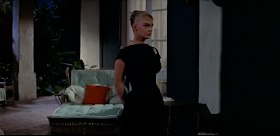By December 1959, Jerry Lewis was wrapping up production on his gender-bending version of Cinderella. Paramount Studios wanted to release the film in summer when Lewis usually garnered a blockbuster hit, especially since children -a big chunk of the comedian's fan base- were out of school. Lewis preferred to release Cinderfella as a Christmas film and set about to make another film to replace the fairytale for summer release. Filmed in less than one month, The Bellboy became a summer hit of 1960.
This comedy is a film of vignettes, a visual diary in the life of the most incompetent bellboy ever. The common threads of each scene in the movie are the star -Stanley the bellboy played by Lewis- and location -The Hotel Fountainebleau in Miami, Florida (where the comedian also performed in a supper club engagement before or during filming).
Because Stanley does not speak, the humor is mostly slapstick and sight gags and reminiscent of that of silent films. There is even a cameo of writer-comedian Bill Richmond dressed as bowler-hatted, silent screen star Stan Laurel.
The humor is mostly physical and, although there is dialogue, there is only enough to set up the visual joke. Thus, although the captain of the bellboys instructs Stanley to take luggage from the trunk of a car to a guest's room, the rest of the gag is completed without speech. The car is a Volkswagen Beetle which carries luggage in front and the engine in the back. What does Stanley take to the guest? The engine, of course.
This brand of humor might require the love of a very specific brand of comedy, but you ultimately relate to it if you've ever been in a hotel (or anywhere else where there are people interacting with each other).
The movie pokes a little fun at belligerent guests. A guest, wearing mixed patterns and ill-fitting golf shorts, argues with the captain of the bellboys that his army of workers should be neatly dressed at all times.
The film doesn't spare the hotel employees either. When an otherwise mature hotel executive squeals like a bobby-soxer at the anticipation of a movie star coming to visit, you have to laugh. No one is safe from the gags.
Ultimately, this film - the first written, directed, produced by and starring Jerry Lewis- is simply Lewis observing his surroundings and playing with material that is right in front of him. It's akin to watching comedian Jonathan Winters do improv with a stick on late night talk shows.
The performer's juggling of behind the scenes work impressed even Milton Berle (who cameos in the film). The Ocala Star-Banner notes
"When Jerry winced from an ulcer pain Berle wrapped it all up with the quip: 'Jerry, why don't you go to your room and operate on yourself? You're doing everything else.'"In another first, The Bellboy is credited with being the first film to use video assist. Lewis invented a system using a monitor which would allow him to watch his own performance on the set, an idea which is still in use today.
Perhaps because of the looming deadlines for the film, there is a brisk, almost live performance quality to it that many movies with more time to film do not have. This bracing pace makes the time whiz by and before you know it, the fun is over.
The Bellboy is a modern tribute to silent film comedies. It is great for a laugh or two about hotels, summer vacations and all that goes with them.
- November 18, 1959 - Associated Press - Jerry Lewis Collapses on the Set of Cinderfella
- March 4, 1960 - Ocala Star-Banner - "Jerry Lewis' Mad Capers 'Fanic' Posh Florida Hotel"
- Buy The Bellboy on Amazon.com























